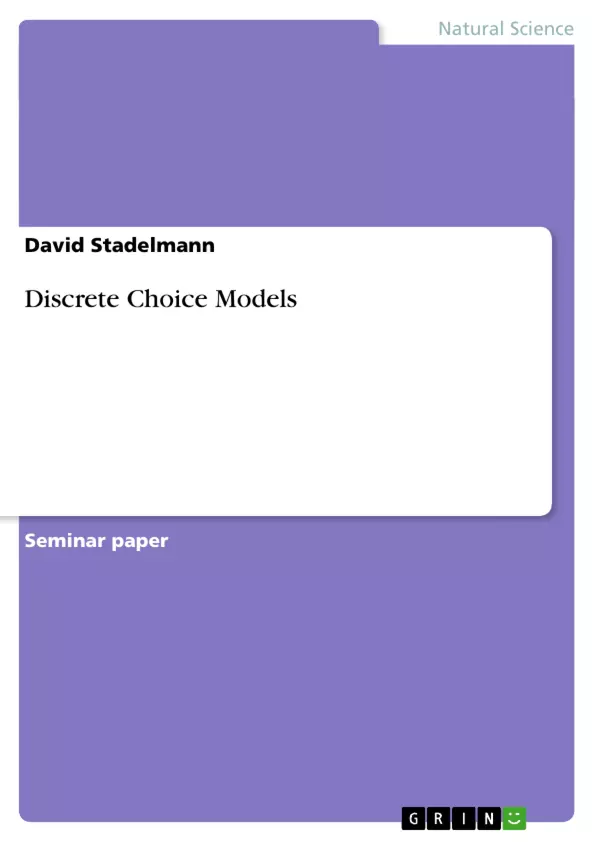There are many settings in which the outcome we seek to model is a discrete choice among a set of alternatives. Almost non of these models can be consistently estimated with linear regression methods. Other methods have been devised for these cases such as the logistic regression model. This paper presents some basic principles of the logistic regression model and explains its estimation using the maximum likelihood method. An econometric application at the end highlights the importance of the theoretical issues discussed.
Inhaltsverzeichnis (Table of Contents)
- Introduction
- Model Specification and History
- Model Specification
- History
- Estimation and Inference
- Estimation
- Hypothesis Tests
- Measuring Goodness of Fit
- Econometric Application
- Concluding Remarks
Zielsetzung und Themenschwerpunkte (Objectives and Key Themes)
This paper aims to present the basic principles of the logistic regression model and its estimation using the maximum likelihood method. It focuses on binary decisions, using a logit model to analyze the impact of explanatory variables on a qualitative dependent variable.
- Logistic Regression Model Fundamentals
- Maximum Likelihood Estimation
- Application of Logit Models to Binary Choices
- Interpretation of Model Parameters and Significance
- Goodness of Fit Measures
Zusammenfassung der Kapitel (Chapter Summaries)
Introduction: This chapter introduces the concept of qualitative dependent variables in regression analysis, contrasting them with continuous variables. It highlights the limitations of linear regression in handling discrete choices and introduces logit models as a suitable alternative for binary and multiple-choice scenarios. Examples such as labor force participation, purchasing decisions, and voting behavior are given to illustrate the applicability of logit models. The chapter outlines the structure of the paper, previewing the topics covered in subsequent sections.
Model Specification and History: This chapter delves into the specifics of the logit model for binary variables. It describes the model using a Bernoulli distribution, explaining how explanatory variables impact the probability of the outcome. The logistic function is introduced as a convenient mathematical representation of this probability, and its properties are discussed, including its first derivative. The chapter also provides a brief historical overview of the logistic function's use, particularly in population growth models.
Estimation and Inference: This chapter explains the estimation procedure for the logit model, focusing on the maximum likelihood method. It outlines the process of estimating the model parameters and testing hypotheses about their significance. Additionally, it discusses methods for assessing the overall goodness of fit of the model. These aspects are crucial for ensuring the reliability and validity of the model's predictions.
Econometric Application: This chapter presents a practical application of the logit model. While the specific application is not detailed here to avoid spoilers, it serves to illustrate the use of the model in a real-world setting and highlights the importance of the theoretical issues discussed earlier. This section likely showcases the model's power in analyzing a specific dataset and drawing meaningful conclusions from it.
Schlüsselwörter (Keywords)
Logistic regression, logit model, binary choice, maximum likelihood estimation, econometrics, qualitative dependent variable, Bernoulli distribution, hypothesis testing, goodness of fit.
Frequently Asked Questions: A Comprehensive Language Preview of Logistic Regression
What is the purpose of this document?
This document provides a comprehensive preview of a paper on logistic regression. It includes the table of contents, objectives and key themes, chapter summaries, and keywords. It is designed to give a thorough understanding of the paper's content before reading the full text.
What topics are covered in the paper?
The paper covers the fundamental principles of logistic regression models, focusing on binary decisions. Key topics include model specification, the history of the logistic function, maximum likelihood estimation, hypothesis testing, goodness-of-fit measures, and a practical econometric application.
What is the main focus of the logistic regression model discussed?
The main focus is on using a logit model to analyze the impact of explanatory variables on a qualitative dependent variable, specifically in situations involving binary choices (yes/no, 0/1).
How is the model estimated?
The paper uses the maximum likelihood method to estimate the parameters of the logistic regression model.
What are the key themes explored in the paper?
Key themes include understanding the logistic regression model's fundamentals, mastering maximum likelihood estimation, applying logit models to binary choices, correctly interpreting model parameters and their significance, and effectively using goodness-of-fit measures.
What is covered in the "Model Specification and History" chapter?
This chapter details the logit model for binary variables, explains the model using a Bernoulli distribution, introduces the logistic function and its properties, and provides a brief historical overview of its use.
What does the "Estimation and Inference" chapter cover?
This chapter explains the maximum likelihood estimation procedure for the logit model, outlines hypothesis testing, and discusses methods for assessing the model's goodness of fit.
What is included in the "Econometric Application" chapter?
This chapter presents a real-world application of the logit model to illustrate its practical use and the importance of the theoretical concepts discussed earlier. The specific application details are not revealed in the preview.
What are the key keywords associated with this paper?
Key keywords include: Logistic regression, logit model, binary choice, maximum likelihood estimation, econometrics, qualitative dependent variable, Bernoulli distribution, hypothesis testing, goodness of fit.
What type of dependent variable is analyzed in this paper?
The paper analyzes qualitative dependent variables, specifically focusing on binary dependent variables where the outcome is one of two possible categories.
What is the difference between a continuous and a qualitative dependent variable?
The introduction likely contrasts continuous variables (which can take on any value within a range) with qualitative (or discrete) variables, which can only take on specific values, such as 0 or 1 in the case of binary choices.
What are some examples of applications for the logit model?
The introduction likely provides examples of real-world applications, such as analyzing labor force participation, purchasing decisions, and voting behavior.
- Citation du texte
- David Stadelmann (Auteur), 2007, Discrete Choice Models, Munich, GRIN Verlag, https://www.grin.com/document/74622



